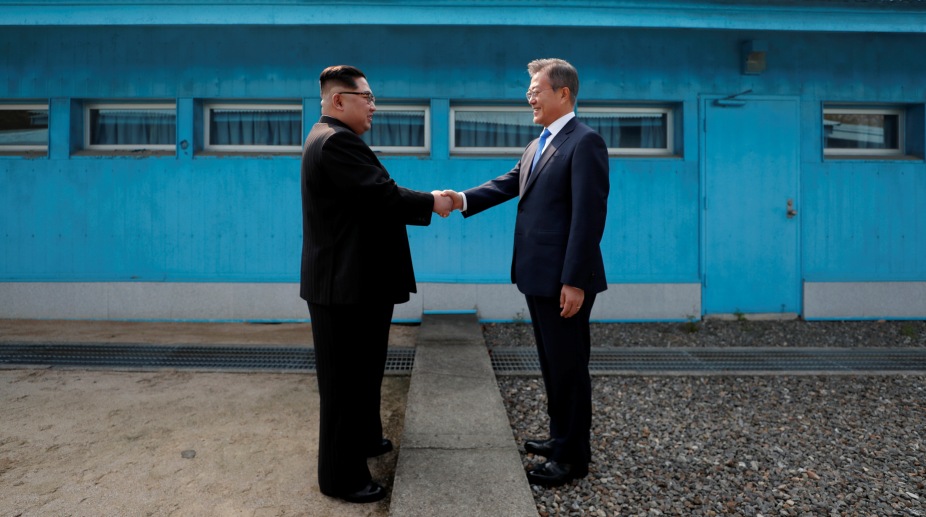It’s a history-making handshake for sure: North Korean leader Kim Jong-un and his South Korean counterpart clasped hands across the military demarcation line that separates the two countries before they ventured behind closed doors to begin their talks.
Symbolism was rife in this carefully coordinated and rehearsed encounter, with even the table they sat across being custom-made for the occasion and measuring exactly 2,018 millimetres wide — a nod to the year this meeting is taking place; a year which may well see a formal end to the 65-year-long Korean war and (possibly) what will be, undoubtedly, a not-to-be-missed summit between Kim ‘Rocket Man’ Jong-un and Donald ‘His Orange Eminence’ Trump.
Advertisement
Peace between the Koreas may or may not break out, denuclearisation may or may not happen and even the Kim-Trump summit is far from confirmed. But one thing is certain: whether he travels to South Korea or to Singapore (a likely choice for the NK-US summit) Kim Jong-un will be taking his toilet with him. This isn’t some metaphor; whenever he travels, the North Korean leader is accompanied by his luxury bathroom.
Now, this would come as a surprise to most North Koreans, as state propaganda would have them believe that Kim’s body is so ‘well-calibrated’ that he does not in fact produce any waste like the rest of us mortals.
Nevertheless, Kim doesn’t commute with his commode because he’s one of those people who simply can’t use other people’s loos; the travelling toilet is actually for security reasons: Kim is concerned that foreign powers and hostile agencies are constantly trying to steal a sample of his stools in order to analyse them and learn if he has any health issues they should know about. This isn’t paranoia, as scatological spying has a long and interesting history.
Stalin, for one, was very interested in learning more about Chinese leader Mao Zedong’s personality, and when Mao visited Russia for what was to be his only meeting with Stalin, the Soviet supremo ordered that his Chinese counterpart (and strategic rival) be well fed and taken care of during his stay.
This wasn’t just hospitality or communist camaraderie, as a well-fed Mao would then also need to frequently visit the bathroom. Unknown to him, his excrement was then collected and sent to a special lab for testing. The tests weren’t designed like those conducted on modern stool samples —which can determine infection etc — but was instead intended to glean clues as to Mao’s personality. Soviet scatologists believed (based on a once trendy pseudoscience) that a subject’s personality could be determined by studying their stools.
One reason the USSR had to resort to this, according to former agent Igor Atamanenko, was because contemporary Soviet spies did not have the kind of listening and surveillance tech available today and so had to resort to ‘extravagant’ means of intel collection.
The Cold War saw a lot of this kind of behaviour: reportedly the CIA and MI6 tried and failed to collect Mikhail Gorbachev’s stool samples ahead of his planned visit to Washington. French spy Count Alexandre de Marenches claimed to have had more luck with Leonid Brezhnev, Marenches revealed that when Brezhnev was staying in a Copenhagen hotel during a state visit, French spies rented the suite below him and, after dismantling the plumbing, “intercepted his toilet flushings and sent the samples to Paris for analysis”.
Operation Tamarisk, while not concerned directly with the intelligence value of human waste, worked on similar lines. Targeting Soviet military liaisons in East Germany, the allies first deprived the Soviets of toilet paper in the hope that — faced with a crippling shortage — they would use official documents as a substitute. The logic went that since these documents couldn’t be flushed down the toilet, they would be discarded along with other trash and, once retrieved and (one hopes) thoroughly washed, could provide much-needed intel.
In more recent times, there is at least one reported case of Israel also plumbing the depths in order to gather information on hostile leaders. When the Syrian leader Hafez al-Assad visited Jordan for the funeral of King Hussein in 1999, he found that a special toilet had been constructed for his personal and exclusive use.
While this may have fed his considerable ego, what he didn’t know was that this toilet was a joint venture between Mossad and Jordanian intelligence and, unlike most other toilets, did not connect to a drain but to a specimen jar. Minutes after he used it, the jar was sped off to a hospital in Israel and analysed.
Reportedly, the Israelis determined that Assad did not have long to live and adjusted their Syria policy accordingly. Modern day espionage is dominated in the popular imagination by high-tech gadgets and near-magical surveillance technology but it’s always useful to remember that it does pay to literally get your hands dirty. After all, it’s not just loose lips that can sink ships.
Dawn/ANN.











